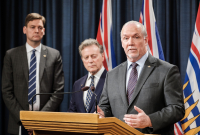Support strong Canadian climate journalism for 2025
Kermit the Frog sang "It's Not Easy Bein' Green," and candidates running to be leader of the Green Party of Alberta might relate.
At a time when the province's oil industry still struggles to recover from a slump and many blame environmentalists for blocking new pipeline projects, one of the party's leadership candidates says some believe the provincial Greens want to shut the oilsands down.
"I think that's definitely a misperception that we need to try and correct," said Brian Deheer from Lac la Biche, Alta., one of two candidates hoping to be chosen leader this weekend.
The party's official policy calls for a "moratorium on development of additional tar sands projects" until the impact of existing and approved projects can be studied. It also says the party "opposes the approval and construction or expansion of any pipeline" for transporting Alberta bitumen.
Deheer, a music teacher who represented the Greens earlier this summer in a provincial byelection in Fort McMurray, said he was asked during that campaign if his chances were hurt because his party "wants to shut the oilsands down."
"That's not what this policy states and that's not what, I would argue, the Green Party is striving for. Certainly there are concerns that we have about the oilsands," he said, adding he'd like to see more solar and wind power added to the province's energy mix.
"The oilsands are here and they're going to be here for a long time but what role do we want that industry to play? What direction do we want as a province want to pursue?"
Cheryle Chagnon-Greyeyes, a leadership candidate from Calgary, said she's encountering more curiosity about her party than hostility, adding many aren't happy with the federal government's recent purchase of the Trans Mountain pipeline project.
Chagnon-Greyeyes said she, too, is in favour of studying green-energy options, but stressed Alberta also needs to keep its bitumen processing jobs in Alberta.
"I drive a car ... I know we need oil at this point in time," said Chagnon-Greyeyes. "I'm saying it can be done in a better way, a smarter way, a more environmentally conscious way that respects Indigenous communities."
The Green Party has never won a seat provincially or federally in Alberta.
As part of the leadership campaign, the party recently asked the candidates where they stood on the moratorium and pipeline policy.
Neither candidate in their responses referred to the oil reserves in northern Alberta as "tarsands," the term that's used in the policy and favoured by some environmentalists.
Both Deheer and Chagnon-Greyeyes said that instead of pipelines, they favour a transport system where heavy crude oil is transformed into pill-sized pellets.
The technique, according to advocates, creates self-sealing balls of bitumen of various sizes that can then be moved in coal rail cars or transport trucks with less risk of environmentally harmful spills, thus reducing the need for new pipelines.
"It makes pipelines obsolete. We can make do with what we've got now as far as pipelines go. But why aren't we bringing those jobs here in the province and producing oil right here?" Chagnon-Greyeyes said.
Party members will vote for the new leader at the Green Party of Alberta annual general meeting on Saturday.





Comments